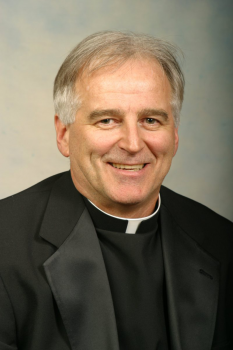Text: Fr Séamus Finn OMI on Together for the Common Good

Fr Séamus Finn
The following is the text of a talk delivered on 6 October 2016 at St Michael's Cornhill London by Fr Séamus Finn, Chair of the US-based Interfaith Center on Corporate Responsibility. He is a Catholic expert on socially responsible investing. He was one of four speakers on the theme: 'Business, Markets and the Common Good: the Challenge of Laudato Si'. The discussion was organised by Together For the Common Good, in partnership with the Benedict XVI Centre at St Mary's University, Twickenham, and supported by CCLA and Social Stock Exchange.
I entered the conversation about Catholic Social Teaching (CST) through two different doors. One was listening to Roman Catholic missionaries primarily from Latin America in the late sixties and seventies. The second was sitting in lecture halls in different schools where the corpus of CST was presented, analyzed and applied to pressing contemporary issues.
These encounters with the tradition were most obviously focused on the great historical themes of church/state and church/society and how these institutions in the modern period interacted, jostled, cooperated and struggled to claim the space and therefore the voice that allowed them to complete and define their reactive missions.
The stories from the ground were primarily about the answering the same questions that Dom Helder Camara and others had raised at the Second Vatican Council. "Church of Jesus Christ what do you have to say for yourself in the midst of and to the two thirds of humanity who are living in abject poverty and excluded from the benefits that decades of progress have promised". The perspective from the classroom was frequently presented as a struggle between the temporal and the eternal the material and the spiritual the competing claims between the fidelity of the believer and the loyalty of the citizen.
Forty years later it seems to me that we find these institutions, when it comes to the consideration of financial systems and how they both operate and contribute to social wellbeing and the future of Mother Earth, wrestling over issues like regulation or free markets, globalization versus protection of local economies and challenge, themes such as inequality, exclusion, development migration, access to education, health care and a decent livelihood, but within the context of a deepening awareness of a damaged environment, and a threatened future.
As John XXIII previewed the growing complexity, interdependence and multiplication of intermediate associations and institutions in an ever expanding reality in the encyclical Mater et Magistra in 1961, more recent encyclicals in the CST tradition have been confronted with the realities of globalization, big data, technology, the carrying capacity of the earth and the acceleration of operations and procedures, in nearly all areas of society, to speeds that were previously unimaginable.
This brings new questions and scrutiny about the viability of the dominant financial system especially in light of the destruction of the environment and the exclusion, inequality and indifference that are being experienced by millions of people within societies across the world. How can it be corrected, who is responsible for taking those corrective actions and where do we find some indicators of promise?
Making the business as well as the moral and ethical case for the inclusion of Environmental, Social and Governance criteria in the assessment of corporations is witnessing significant recognition and acceptance across many industries. This is the result of a combination of the advocacy of socially responsible investment (SRI) and FCI investors and of civil society, the enragement of local communities and the responsiveness of government and in some instances the enlightened leadership of some chief executive officers.
Many FCI and SRI investors having worked for years through the lens of what they would not invest in are working to move beyond negative screening that only excludes the industries and companies that do not pass muster with their ethical investment codes and are diligently looking for investment opportunities and vehicles whereby they seek to identify and participate in constructive investment opportunities. The sectors that are generally included in these investment opportunities are sustainable agriculture, clean technology, microfinance, and affordable and accessible basic services including housing, healthcare, and education.
While in the CST tradition the benefits of Cooperatives and Credit Unions have been lifted up for over a century and continue to offer promising services and opportunities in many communities the more recent mechanisms of microfinance, micro insurance, revolving loan funds and microcredit have also been supported, incubated, adopted and promoted to the point that they have become of interest to mainstream financial institutions.
Impact Investments, Pay for Success contracts, Social Finance and Green bonds are being created and offered to investors. Many of the Impact Investments instruments that are being created through private equity offerings and private institutional investors are joining with global and regional development institutions like the IFC and the ADB and the IDB as well as with sovereign development funds like DFID and USAID in these funds.
For the OIP TRUST we have invested in at least 5 such funds with an expected market rate of return. Examples of these funds are:
8 Miles Fund - $10M Consumer goods, Financial services, Agribusiness
Elevar Equity III - $10M Thematic India/Peru
Sofinnova Healthquest I $5M Heath care Initiatives & Technologies
Healthquest II- $10M
Neuberger Berman RE $5M Residential real estate mortgages
Pembani-Remgro- $10 Infrastructure Africa
In a period when many institutional investors have had to adjust their return objectives into the 4 - 7% range many of these projects and funds align well not only with their expectations on return but with the mission of their institutions and are congruent with their program related investments.
My experience with the mining sector over the last four years is also encouraging. At the request of some leading CEO's a dialogue was opened about the future of mining first with the Vatican, then with Lambeth Palace and other religious leaders in the UK and continued in South Africa, Zambia and Peru. This has resulted in a number of practical projects that are talking about how the mining company of the future will operate and integrate both their social and environmental responsibilities across their planning and operations. How indeed might we conceive and transform the industry into a reliable development partners for communities and regions and countries that seek to exploit sustainably their natural resources?
In the financial sector the major drivers of the near meltdown of 2008 have been identified and numerous commissions have examined their origins and their contagious nature and made recommendations about how future crises of this magnitude can be avoided. They have also opened a significant conversation on how the system and the financial institutions must called to fulfill their "social license to operate" and serve the common good and provide basic financial services to those who are frequent and large scale operators in the system and those who count on executing very basic routine transactions a few times a month.
In another recent WP OP ED it was stated that "The Federal Reserve estimates about half of the U.S. population can't cover a shortfall of $400 due to an unexpected expense without borrowing the money. More than one in four Americans -- 88 million -- are either unbanked or underbanked -- meaning that they rely on alternative financial services such as payday lenders and pawn brokers that gouge routinely. As Mehrsa Baradaran reported in the Nation, the unbanked pay a significant portion of their paychecks -- around 10 percent -- to use and move their money. This is more than the average low-income family spends on food."
The policy debate continues about how to regulate and monitor "too big to fail" and "Systemically Important Financial Institutions" and whether the services needed by the majority would best be served by banks that were more like utilities. The absence of harmonization in a globally integrated financial system between the countries in the G20 is yet another dimension of that debate.
On the positive side many of these very large institutions whether as a result of the catastrophic crisis or the threat of greater government intervention or the advocacy of investors and civil society have demonstrated some willingness to learn from their mistakes but there is still a good distance to go. They have produced public reports on the culture and business standards of their institutions and detailed the changes that they have put in place since the crisis. Some have abandoned extraneous and more risky business lines and returned to their core operations. Many have developed metrics to integrate and measure the social and environmental impacts of their lending and transaction activities and devoted resources to the analysis and development of impact funds.
In offering impact funds to their clients they are clearly responding to the wishes of their clients but they are hopefully also responding to the pressing environmental crises that have been identified by many religious and world leaders and measured and analyzed by scientists and addressed by the United Nations general assembly as urgent.
As the UN searches for ways to finance the realization of the Sustainable Development Goals, these institutions are being offered an opportunity to participate in the development of blended financing tools and funds that will join with the public sector and with private investors to support and promote these ambitious goals.
In an OP Ed in the Washington Post last Monday, Tom Wilson the chairman and chief executive officer of the Allstate Corporation and vice chairman of the US Chamber of Commerce offered the following perspective on how corporations should consider further integrating CSR into their mission.
"The corporation of the next 100 years must take on societal problems. On their own, governments, social service and charitable organizations simply do not have the capabilities and resources to solve the problems of inadequate education, poverty or public fiscal insolvency. And most people agree:
In a recent survey, 87 percent of young Americans said corporations should do more than just make money. Corporations should be encouraged and rewarded for stepping up to solve society's problems. That will require a change in mind-set. Today, corporate leaders are graded on stock price, not on the amount of good their companies do. We must broaden our evaluation of corporations beyond share prices to provide space, light and water for their role to grow.
In Laudato Si' and in his address to the second World Meeting of Popular Movements, Pope Francis was enthusiastically hopeful about our creativity and responsiveness in addressing some of the many challenging issues that we must face. "God, who calls us to generous commitment and to give him our all, offers us the light and the strength needed to continue on our way. In the heart of this world, the Lord of life, who loves us so much, is always present. He does not abandon us, he does not leave us alone, for he has united himself definitively to our earth, and his love constantly impels us to find new ways forward. Praise be to him!" (242)
See Fr Séamus Finn speaking here: www.youtube.com/watch?v=oIryeykIraI















